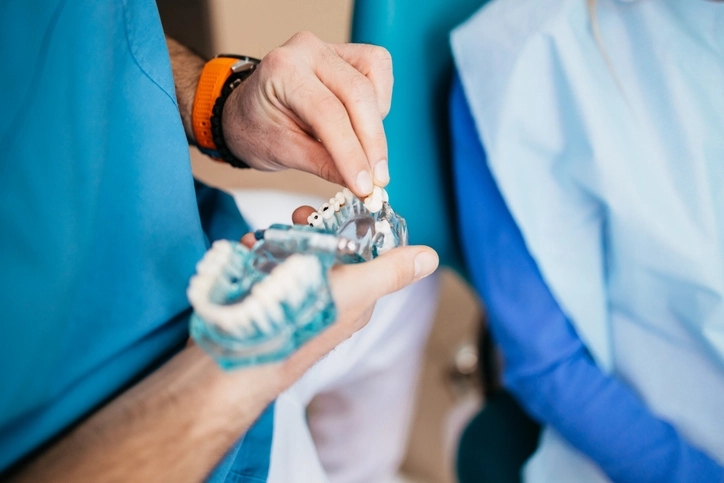How Long Do Dental Implants Last?
How Long Do Dental Implants Last?
Missing teeth have found their match in dental implants. This restorative dentistry option helps restore smiles, boost confidence, and improve overall health. Brookwood Dental Center explores everything you need to know about dental implant longevity, including average life expectancy, factors affecting their lifespan, and tips for maintaining them. If you’re considering dental implants or already have them, understanding their care and durability is key to ensuring long-term satisfaction. Reach out to us to learn more about restorative dentistry options.

What Are Dental Implants?
Dental implants are advanced tooth replacement solutions customized to your mouth. They look and feel like natural teeth. An implant consists of three components, including a titanium post that serves as the root, an abutment that connects the post to the restoration, and a crown or prosthetic tooth that completes the process.
Through that natural process of osseointegration, the implant fuses with the jawbone for a secure and permanent fit. Millions of dental patients choose implants because they offer a natural-looking, permanent solution that feels and functions like natural teeth.
Average Lifespan of Dental Implants
On average, dental implants can last two to three decades, and in many cases, a lifetime when cared for properly. The titanium post is biocompatible and designed to remain intact for decades, while the crown or prosthetic tooth may require replacement every 10 to 15 years due to normal wear and tear. While the upfront cost of dental implants is typically more than some other restorative dentistry options, their longevity makes them worth the investment.
Factors That Affect the Lifespan of Dental Implants
Dental implants have a shelf life if they aren’t cared for properly. They’re created as a long-term solution for missing teeth, but several factors can influence their lifespan. Below, we explain the factors that can impact the lifespan of your implants.
Oral Hygiene Practices
The most important thing to do is take care of your dental implants. Gum infections and plaque buildup caused by poor oral hygiene can compromise the surrounding bone and tissues, affecting the stability of the implant. Regular brushing, flossing, and professional cleanings are key.
Overall Health
Conditions like diabetes, osteoporosis, or autoimmune disorders can impact healing and bone strength, potentially reducing implant longevity. Maintaining good general health and managing chronic conditions can support more successful outcomes.
Jawbone Density
Adequate jawbone density is crucial to properly anchor the implant. Periodontal disease or aging can cause bone loss that weakens the implant’s foundation. We may advise bone grafting in extreme cases for long-term stability.
Lifestyle Habits
Lifestyle habits can impact your dental implant. Smoking, excessive alcohol consumption, and poor dietary habits can lower implant success rates. Smoking hinders blood flow to the gums and cause delayed healing, increasing the risk of implant failure.
Material and Placement
High-quality materials and experienced dental professionals play a significant role in implant success. It’s essential to have dental implants properly placed for success. Our qualified dental team ensures your dental implants are properly placed to maximize their longevity.
How to Extend the Life of Your Dental Implants
Our dental team ensures your dental implants last as long as possible. We help you learn the best ways to maximize their longevity. Here are some steps to help extend the life of your implants:
- Stick to a Routine Oral Hygiene Regimen: Continue a healthy oral hygiene regimen of brushing, flossing, and using mouthwash regularly.
- Schedule Regular Dental Visits: Professional dental check-ups and cleanings allow us to find any issues early and monitor the state of your implants.
- Avoid Hard or Sticky Foods: For added protection, consider limiting foods like hard candies or chewy snacks that could damage the crown.
- Quit Smoking: Reducing or quitting smoking will improve healing and support better oral health outcomes.
- Wear a Night Guard if Necessary: Teeth grinding or clenching can put undue pressure on implants. A night guard can help protect your mouth while you sleep.
Signs Your Dental Implant May Need Attention
While dental implants are designed to be low-maintenance, issues can arise. It’s important to recognize when your implant may need professional attention. The most common signs your dental implant needs attention include:
- Redness, swelling, or bleeding around the implant site
- Persistent pain or discomfort
- A loose or wobbly implant
- Difficulty biting or chewing
- Visible cracks or damage to the crown
Contact Brookwood Dental Center
Brookwood Dental Center helps patients restore smiles with our dentistry services. Dental implants offer a reliable and lifelong solution for missing teeth when cared for properly. We’ll give you tips over time of how to continue to take care of your dental implants. You can trust us to listen to your dental concerns and meet your needs. Reach out to us today to learn more about our dental implant solutions.
Frequently Asked Questions
- How long do dental implants last? Dental implants can be a lifelong investment with proper care. Most last decades, but the crown part of the implant may need to be replaced after 10 to 15 years.
- Are dental implants permanent? Yes, dental implants are permanent when cared for properly. When the titanium post integrates with the jawbone, it creates a stable and long-lasting foundation.
- What affects the lifespan of dental implants? The most common factors that can affect the lifespan of your dental implants include oral hygiene, general health, jawbone density, lifestyle habits, and the quality of materials and placement.
- Can dental implants fail? Yes, in rare instances. A dental implant failure can happen due to infection, insufficient jawbone, or improper placement. Early intervention can often resolve issues.
